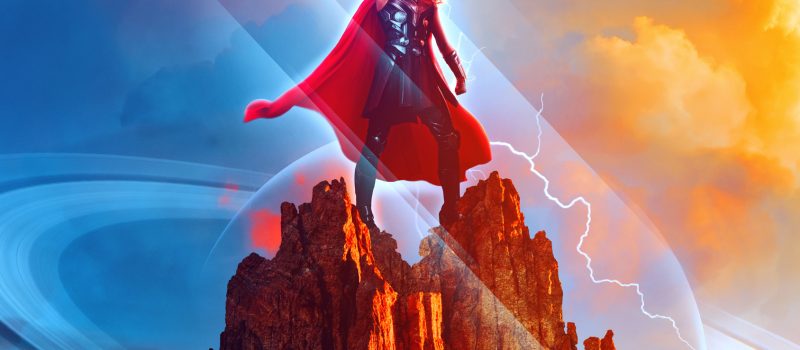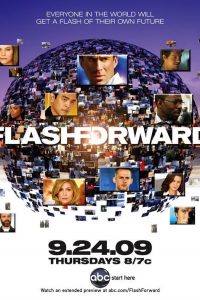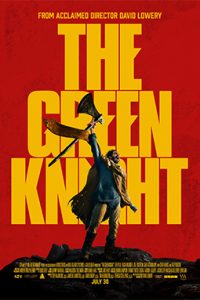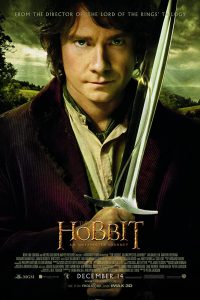Good God, Y’all: Arley Sorg and Josh Pearce Discuss Thor: Love and Thunder
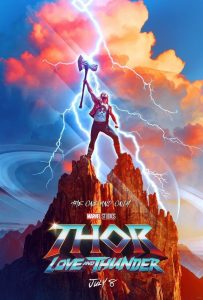 Picking up after Thor: Ragnarok and Avengers: Endgame, the fourth Thor standalone film reunites the God of Thunder (Chris Hemsworth) with his scientist ex-girlfriend Jane Foster (Natalie Portman), his rock-alien-monster friend Korg (director Taika Waititi), and the fresh king of New Asgard, Valkyrie (Tessa Thompson). After a stint of adventuring with the Guardians of the Galaxy, Thor is shocked to discover that normal Earth mortal Jane has somehow reassembled — and now wields — his ex-hammer Mjölnir, because of love/magic/science/cancer.
Picking up after Thor: Ragnarok and Avengers: Endgame, the fourth Thor standalone film reunites the God of Thunder (Chris Hemsworth) with his scientist ex-girlfriend Jane Foster (Natalie Portman), his rock-alien-monster friend Korg (director Taika Waititi), and the fresh king of New Asgard, Valkyrie (Tessa Thompson). After a stint of adventuring with the Guardians of the Galaxy, Thor is shocked to discover that normal Earth mortal Jane has somehow reassembled — and now wields — his ex-hammer Mjölnir, because of love/magic/science/cancer.
MEANWHILE, elsewhere in the galaxy, a man named Gorr (Christian Bale) loses his faith when his daughter dies. After inheriting the Necrosword, he not only kills his local god, but also begins a crusade against all deities in existence, which earns him the nickname “the God Butcher.” To bait Thor, Gorr kidnaps the children of New Asgard. Somebody save the children!
Josh: I absolutely loved this movie.
Arley: Yeah, I thought it was a lot of fun. I didn’t like the other one, Ragnarok, all that much, so I was expecting to not like this. But the movie was really awesome! It was super funny and utilized different kinds of humor: dumb one-liners, clever humor, meta humor, visual humor, and the screaming goats were like auditory humor. You have setups and callbacks….
Josh: Those goats never got old. I laughed every time.
It is easy to sympathize with the God Butcher — if he wasn’t actively being “corrupted” by the Necrosword and resorting to kidnapping, we could view him as an anti-hero trying to upend the rule of a decadent 1% over the rest of the universe. Like the character of Butcher from The Boys, he simply believes that no one should have the absolute power (and its proportionate corruption) of gods.
Thus we are treated to Omnipotent City, where the gods eat, drink, and make orgy in blissful denial of the God Butcher threat. Thor petitions help from the ruler of the city, Zeus (Russell Crowe with a “Greek” accent), and is denied, because the gods care for nothing but themselves. Thor appears to be the only good god in the entire universe, and even that is not necessarily inherent — his time spent with humans and his love for Jane have certainly had an effect on the person he used to be.
Josh: I’m an atheist, so right away I was like, “Yeah! Kill all the gods! Who needs ’em?”
Arley: Even the opening looked really good and was effective in drawing you into the movie. This super serious opening — which sort of sets the stage, because you’ve seen the previews and you’ve seen Ragnarok most likely, so you know this is going to be funny — that opening gives the film room to also be like, well, we’re going to have this pensive throughline and there’re darker notes to the overall narrative. I think if you opened with humor, it would be harder to go back to serious. It also establishes Gorr’s character but they don’t belabor it. They’re like, let me give you this real quick. It’s a nice prologue essentially.
Josh: Yeah, it’s, “Here’s the guy you hate, here is the only weapon that can kill him, go.” I liked Gorr’s character design, and I thought Christian Bale disappeared pretty nicely into the role. His look is what I imagine Gideon the Ninth to look like — necromancer sword fighters in spaaaaace! — and the way he was teleporting made the fight scenes fun to watch.
What even is the difference between a god and a superhuman? In a later speech, Zeus says that mortals no longer look to the sky to petition the gods, they look up hoping for a glimpse of a superhero. And now we have an even more muddled MCU cosmology: there are not only actual gods and demigods (Thor, Odin, Zeus, Hercules, etc.) but also, as seen in The Eternals, alien robots being mistaken for gods (Ajak, Phastos, Ikaris, Thena, etc.). How is the mythology of Zeus and Hercules being transmitted to Earth?
Arley: I liked how they developed this community of gods, a cross-pantheon community.
Josh: I feel like they might be painting themselves into a corner for the next crossover or team-up movie. How are they going to get all these characters to mesh?
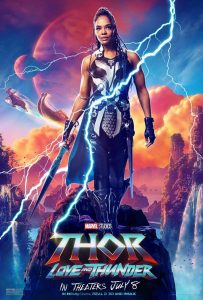 Arley: I feel like this movie is riding that line more, of serving people who don’t read comic books as well as people who do read comic books. Comic book readers will be less worried about the characters meshing, because they are used to seeing the team ups. There’s a lot of core superhero fun stuff in here, and a lot of the narrative storylines and subjects were drawn from comic books. It’s more satisfying than many of the Marvel movies where they’re shredding core material to make products for broader audiences. Comic book readers, we always tend to be excited for the issues where it crosses over with other teams or characters, and we’re so excited about it that even if we recognize that something makes no sense, we’re like, whatever. We’re ready to throw money at the theater for those crossovers. One of the most classic, iconic matches is Hercules versus Thor. People who read Avengers or Thor comic books will be extremely excited about that. And please throw the Hulk in, too. Just a big dumb brawler battle.
Arley: I feel like this movie is riding that line more, of serving people who don’t read comic books as well as people who do read comic books. Comic book readers will be less worried about the characters meshing, because they are used to seeing the team ups. There’s a lot of core superhero fun stuff in here, and a lot of the narrative storylines and subjects were drawn from comic books. It’s more satisfying than many of the Marvel movies where they’re shredding core material to make products for broader audiences. Comic book readers, we always tend to be excited for the issues where it crosses over with other teams or characters, and we’re so excited about it that even if we recognize that something makes no sense, we’re like, whatever. We’re ready to throw money at the theater for those crossovers. One of the most classic, iconic matches is Hercules versus Thor. People who read Avengers or Thor comic books will be extremely excited about that. And please throw the Hulk in, too. Just a big dumb brawler battle.
Josh: They know what you want. And that’s why they put it in there.
Arley: This movie, too, for being obviously a ton of CGI, didn’t look like CGI. I wasn’t pulled out by the effects. Somehow, they did a really good job, where so many other movies don’t.
Josh: Because it blends so well into the actual visual storytelling. It’s not just throwing a big creature onscreen for no reason, which is usually what happens. Like you were saying, there were cool battle scenes. I loved how Natalie Portman’s hammer would split into a shrapnel thing and then reform and split again. That’s great! It took this basic power that they had, that we’d seen before, and evolved it into something new and interesting to look at. The cosmic astronomy backdrops all looked amazing, as well.
If we were concerned with plot holes (and here we assuredly are not), we would also wonder at the coincidence that the ultimate key to Gorr’s plan just happens to be the Bifrost, summoned by Thor’s axe. Do other planets in the Marvel Cinematic Universe have as much weird shit happening to them on such a regular basis, or is it just ours? (Do other Federation starships run into universe-ending space anomalies and temporal rifts and all-powerful aliens every week, or is it just the Enterprise?)
Waititi cranks up the ’80s heavy-metal-fantasy aesthetic that he started in Thor: Ragnarok; from the opening Marvel Studios theme song guitar solo, to the film’s running soundtrack, to the bright-and-dazzle color palette. Thor: Love and Thunder is the spiritual descendant (or unholy love-child) of dumb strongman scifi-fantasy-adventure movies like Krull, The Beastmaster, Deathstalker, Yor, or The Warrior and the Sorceress.
Josh: There’s an art style called maximalism — the opposite of minimalism — and this film fits right in with that. Other examples are Speed Racer, Into the Spider-Verse, Moulin Rouge, Everything Everywhere All at Once. Like a dazzling, visual sensory overload that I really enjoy. Contrasting that with when Gorr lures them to the Shadow Realm where everything is monochrome: his planet is like Olafur Eliasson’s “Room for One Colour” art exhibit, which fucks with people’s minds because their normal perception of color has been completely distorted.
Arley: There are so many cool visual moments, like when Jane’s holding the hammer in the negative realm, her shoulder is cast in color, as if the hammer is giving off light. Just a lot of really cool little details. I liked the shadow monsters. I think it was a smart move that they didn’t go too close in on them because they probably would have looked cheesy. Keeping them somewhat obscure, so you never get a really good look at them, elevates the tension and the horror and the suspense and makes them more effective as monsters.
Josh: Everything’s summed up by Dio’s “Rainbow in the Dark” playing over the end credits. The theme of the movie is Bifrost in the Shadow Realm.
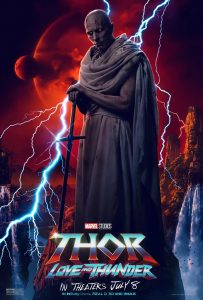 Similar to Spider-man: No Way Home and Everything Everywhere All at Once, the antagonist in Thor: Love and Thunder is ultimately defeated not with violence, but with healing. Maybe Gorr was a horrible monster bent on unjustified revenge. Maybe his egalitarian ends were corrupted by his haunted means. In either case, real monsters, in the shape of gods and superheroes beyond accountability, are still out there — to be worshipped and feared (or fought and defeated) in future stories.
Similar to Spider-man: No Way Home and Everything Everywhere All at Once, the antagonist in Thor: Love and Thunder is ultimately defeated not with violence, but with healing. Maybe Gorr was a horrible monster bent on unjustified revenge. Maybe his egalitarian ends were corrupted by his haunted means. In either case, real monsters, in the shape of gods and superheroes beyond accountability, are still out there — to be worshipped and feared (or fought and defeated) in future stories.
Arley: Highly recommended.
Directed by: Taika Waititi
Written by: Taika Waititi & Jennifer Kaytin Robinson, based on the comics by Stan Lee & Jason Aaron
Starring: Chris Hemsworth, Natalie Portman, Christian Bale, Tessa Thompson, Taika Waititi, Russell Crowe & Jaimie Alexander

JOSH PEARCE has stories and poetry in Analog, Asimov’s, Beneath Ceaseless Skies, Cast of Wonders, Clarkesworld, IGMS, Nature, and more. Find him on Twitter: @fictionaljosh, or at fictionaljosh.com. One time, Ken Jennings signed his chest.
ARLEY SORG, Senior Editor, has been part of the Locus crew since 2014. Arley is a 2022 Kate Wilhelm Solstice Award recipient. He is also a 2021 and 2022 World Fantasy Award finalist as well as a 2022 Locus Award finalist for his work as co-Editor-in-Chief at Fantasy Magazine. He is a 2022 Ignyte Award finalist in two categories: for his work as a critic, and for his essay “What You Might Have Missed” in Uncanny Magazine. Arley is Associate Editor and reviewer at Lightspeed & Nightmare magazines, columnist for The Magazine of Fantasy and Science Fiction, and interviewer at Clarkesworld Magazine. He grew up in England, Hawaii, and Colorado, and lives in the SF Bay Area. A 2014 Odyssey Writing Workshop graduate, he can be found at arleysorg.com – where he has started his own “casual interview” series with authors and editors – and on Twitter (@arleysorg).
 While you are here, please take a moment to support Locus with a one-time or recurring donation. We rely on reader donations to keep the magazine and site going, and would like to keep the site paywall free, but WE NEED YOUR FINANCIAL SUPPORT to continue quality coverage of the science fiction and fantasy field.
While you are here, please take a moment to support Locus with a one-time or recurring donation. We rely on reader donations to keep the magazine and site going, and would like to keep the site paywall free, but WE NEED YOUR FINANCIAL SUPPORT to continue quality coverage of the science fiction and fantasy field.
©Locus Magazine. Copyrighted material may not be republished without permission of LSFF.


